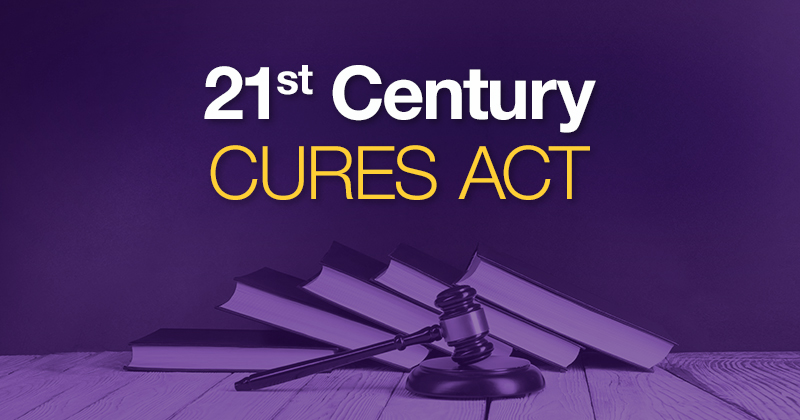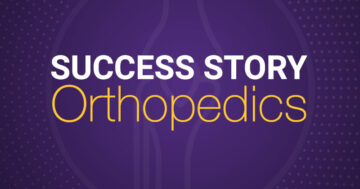The 21st Century Cures Act and Your EHR

Just like the E/M code changes of early 2021, the 21st Century Cures Act and the regulations promulgated thereunder have impacted all of us in healthcare. ModMed® has taken diligent and proactive steps with our IT development and clinical teams to ensure we are promoting interoperablility.
Whether your practice utilizes EMA®, gGastro® or any of the other products offered to our Allergy, Asthma & Immunology, Dermatology, Gastroenterology, OBGYN, Ophthalmology, Orthopedics, Otolaryngology, Pain Management, Plastic Surgery, Podiatry and Urology communities, we are taking steps to be in compliance with the 21st Century Cures Act.
What is the 21st Century Cures Act?
The 21st Century Cures Act: Interoperability, Information Blocking, and the ONC Health IT Certification Program is also known as the “Cures Act”. It was adopted into law on December 13, 2016, and the Office of the National Coordinator for Health Information Technology (“ONC”) issued final regulations implementing certain provisions of the Cures Act in May 2020 (the “Cures Act Final Rule”). The Cures Act Final Rule was modified by the Information Blocking and the ONC Health IT Certification Program: Extension of Compliance Dates and Timeframes in Response to the COVID-19 Public Health Emergency interim final rule (the “Cures Act Interim Final Rule”), which was released by ONC on October 29, 2020, and deferred many of the deadlines set forth in the Cures Act Final Rule in light of the ongoing COVID-19 Public Health Emergency.
The Cures Act and the Cures Act Final Rule include a wide range of requirements that will impact the ModMed community, including updates to the certification requirements applicable to our certified EHR systems (“CEHRT”) and a prohibition on “information blocking” that applies to those defined as “Actors” under the rule, including developers of health IT like ModMed and our healthcare provider clients.
What are the intended improvements of the Cures Act?
The Cures Act encompasses a wide range of intended improvements to the healthcare system, including:
- Acceleration of research into preventing and curing illness and drug and medical device development
- Efforts to address the opioid abuse crisis
- Improvements to mental health service delivery
- Updates to the Office of National Coordinator for Health Information Technology (“ONC”) Health IT Certification Program’s certification requirements
- Improvements to interoperability of health information technology
- Prohibition of information blocking
How could these changes affect my practice and ModMed’s EHR solutions?
The final rule adopted by the ONC in connection with the Cures Act included two parts that are particularly relevant to the ModMed community:
- New health IT standards, implementation specifications, certification criteria and requirements applicable to ModMed and its products in connection with obtaining and maintaining our status as a certified electronic health record technology.
- A prohibition on activity defined as “information blocking” within the Cures Act Final Rule, which prohibition applies to “Actors” as defined in the rule, which includes ModMed and our provider clients.
What is “information blocking”?
Information blocking has been defined by ONC as a “practice by a health IT developer of certified health IT, health information network, health information exchange, or health care provider that, except as required by law or specified by the Secretary of Health and Human Services as a reasonable and necessary activity, is likely to interfere with access, exchange or use of electronic health information (EHI).” (see, e.g., Information Blocking)
The Cures Act and the Cures Act Final Rule specify certain practices that could constitute information blocking, including, without limitation, the following:
- Restrictions on access, exchange or use
- Limiting or restricting interoperability
- Impeding innovation and advancements in access, exchange or use of health IT-enabled care delivery
- Rent-seeking or other opportunistic pricing practices; and
- Non-standard implementation practices
What is “interoperability” in healthcare?
Healthcare interoperability is the capability of each of your technology platforms (such as your EHR, patient messaging, appointment scheduling, and payment/collections technology) to communicate with one another and share information.
Increasing interoperability in healthcare settings entails the added challenge of ensuring HIPAA compliance and adhering to all patient privacy and health data regulations while sharing information across multiple technology platforms.
The 21st Century Cures Act was signed into law to help further promote interoperability throughout the healthcare industry for the benefit of public health and the advancement of health innovation. The Act promotes best practices for the use of technology to advance medical innovation and improve public health and information accessibility while protecting patient privacy.
The 21st Century Cures Act and federal regulations implementing its requirements seek to promote patients’ access to their own health information and support the ability to share that information, empowering patients to actively participate in their own healthcare. They also include requirements that promote health IT interoperability and prohibit information blocking by developers of health IT certified by the federal government, health information exchanges and networks, and healthcare providers.
How is EHI defined?
“EHI” means electronic health information and is defined to include:
- From April 5, 2021, through October 5, 2022, the data elements represented in the USCDI standard; and
- Starting October 6, 2022, all EHI in electronic medical records or other electronic designated record sets as defined by HIPAA.
What is the CMS Final Rule?
On the same date on which ONC adopted the Cures Act Final Rule, the Centers for Medicare & Medicaid Services (“CMS”) adopted the“Interoperability and Patient Access Final Rule” (the “CMS Final Rule”), which included related requirements intended to facilitate interoperability and patient access to health information, including the requirements that providers include digital contact information within their NPPES listing and requirements for hospitals related to admission, discharge and transfer (or ADT) event notifications.
When did the Cures Act Final Rule take effect?
As noted above, through the Cures Act Interim Final Rule, ONC, the agency responsible for issuing the Cures Act Final Rule, announced a deferral of certain compliance deadlines associated with the rule. For example, the information blocking and certain other provisions of the Cures Act Final Rule were scheduled to be effective as of November 2, 2020, but that timeline was delayed until April 5, 2021.
What is ModMed doing to comply with the Cures Act and the Cures Act Final Rule?
We are diligently working to implement updates that may be required to ensure that our systems are and remain current with applicable Cures Act and Cures Act Final Rule EHR certification and information blocking requirements. We are in the process of road mapping all of the software updates that will be required to maintain certified status for our CEHRT consistent with the deadlines set forth in the Cures Act Final Rule, as updated via the Cures Act Interim Final Rule.
We have also reviewed our interoperability-related services to ensure compliance with the regulatory requirements, to the extent applicable.
What is ModMed doing to identify additional opportunities for your practice to connect with the larger healthcare ecosystem?
We recognize that ONC, CMS and other government agencies have prioritized interoperability and the ability of patients and providers to have more seamless access to health information. In pursuit of that stated goal, we continue to develop our technology and business processes to help you connect with third parties to enhance your provision of care to your patients and the efficient operation of your medical practice.
Since healthcare regulations are continually evolving, it’s vitally important for your practice to partner with an EHR solution that is committed to compliance with applicable legislation, including the Cures Act.


